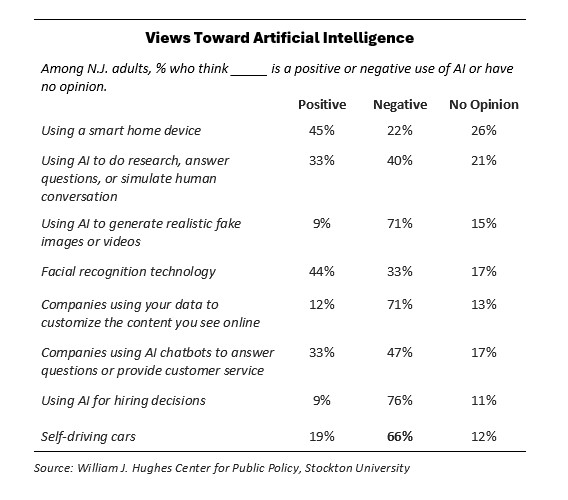Poll: New Jerseyans of All Ages Believe AI Needs Oversight

The poll of 606 New Jersey residents was released by the William J. Hughes Center for Public Policy at Stockton University.
Galloway, N.J. — More than one-third (36%) of New Jersey residents think the increased use of artificial intelligence will make their lives worse, and a majority want oversight over the technology, according to a Stockton University poll released today.
A majority of residents (56%) have heard a lot about artificial intelligence, while 36% have heard at least a little. Only 8% said they haven’t heard anything about AI.
Residents’ opinions of AI vary widely depending on the use, but none of the applications asked about garnered majority support. Pluralities of 45% and 44% view the use of smart home devices or facial recognition technology as positive uses of AI, respectively, but more than 70% have a negative view of uses like generating fake images or videos (71%), companies using personal data to customize the content users see online (71%) or using AI in hiring decisions (76%).

“Artificial intelligence is already ingrained in many aspects of daily life, but people are feeling uneasy about some of the ways it’s being used,” said Hughes Center Interim Director Alyssa Maurice. “Technology continues to outpace policy and AI is no exception. The poll shows residents want those regulatory guardrails in place.”
The poll of 606 New Jersey residents was released by the William J. Hughes Center for Public Policy at Stockton University and has a margin of error of +/-4.0 percentage points.
Residents are split over how AI will impact their lives. A plurality of 36% said the increased use of AI will make their lives worse, while 1 in 4 (25%) said it will make their lives better. About the same rate (26%) said it will have no impact. Just over 1 in 10 (12%) are not sure how it will affect them.
Of those who think it will improve their lives, a majority (58%) said the main reason is for convenience, or that it will make their daily tasks easier or faster, followed by 13% who said it will make their jobs easier. The third most cited reasons were that AI is helpful for learning and that it will lead to medical or diagnostic advancements, both at 5%.
Among those who think AI will make their lives worse, the main reason cited was privacy concerns (24%), followed by job loss (19%) and the spread of misinformation (17%).
Most residents have very little (44%) to no trust (35%) that AI will be used ethically and responsibly, while 16% have some trust and 2% have a lot of trust it will be used in good faith. As many as 78% of respondents think the increased use of AI will cause the spread of false information to increase, while only 4% think it will cause misinformation to decrease and 9% think it will have no effect.
Given these concerns, most residents said it is very important (57%) or somewhat important (23%) to them to have government regulations and oversight over the use of AI, while 12% said it was either not very important or not at all important to them.
An overwhelming majority of 90% said images, audio or video created with AI should be required to include a label disclosing that, while 4% opposed such a measure.
People across all demographics held similar views. Notably, there were minimal generational differences in opinions of the new technology.
“Young people may have a slightly more positive outlook than their older counterparts on some uses of AI, like smart home devices and AI chatbots, but people of all ages were on the same page about the potential for harm and the need for oversight,” Maurice said.
Click here for full poll results.
Methodology
The poll of New Jersey adult residents was conducted by the Stockton Polling Institute of the William J. Hughes Center for Public Policy from Feb. 20-March 3, 2024. Stockton University students texted cell phones with invitations to take the survey online and Opinion Services supplemented the dialing portion of the fieldwork, which consisted of cell and landline telephone calls. Overall, 96% of interviews were conducted on cell phones and 4% on landline phones. In terms of mode, 82% were reached via dialing and 18% were reached via text-to-web. A total of 606 New Jersey adult residents were interviewed. Both cell and landline samples consisted of random digit dialing (RDD) sample from MSG. Data are weighted based on U.S. Census Bureau ACS 2022 data for New Jersey on variables of age, race, education level and sex. The poll's margin of error is +/- 4.0 percentage points at a 95% confidence level. MOE is higher for subsets.
About the Hughes Center
The William J. Hughes Center for Public Policy at Stockton University serves as a catalyst for research, analysis and innovative policy solutions on the economic, social and cultural issues facing New Jersey, and promotes the civic life of New Jersey through engagement, education and research. The center is named for the late William J. Hughes, whose distinguished career includes service in the U.S. House of Representatives, Ambassador to Panama and as a Distinguished Visiting Professor at Stockton. The Hughes Center can be found on YouTube, and can be followed on Facebook @StocktonHughesCenter and X @hughescenter.


